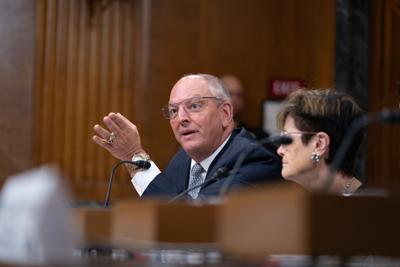Elections for governor are generally all about the candidates competing for the job.
But when no incumbent is running, they’re also about the person who will soon leave the office, particularly if the outgoing governor has been around for two terms.
Call it the fatigue factor, and think about how it’s played out in the past.
Louisianans seemed to like Mike Foster just fine. But when his eight years were up in 2003, wannabe governors honed in on what was widely deemed his greatest weakness, Foster’s reluctance to travel the world seeking investment, and promised to go out on the road.
The next two-term governor, Bobby Jindal, infuriated many Louisianans by being gone so much — specifically in Iowa and New Hampshire, where he was launching a presidential bid — and focusing on national partisan priorities amid a state budget crisis. And so the candidates to succeed him in 2015 vowed to stick around and focus relentlessly on Louisiana’s needs.
Now we’re at the end of another two-term governorship, and John Bel Edwards seems positioned to be this year’s punching bag.
What’s interesting is that in many ways, he’s not.
The obvious rub against Edwards is that he’s a Democrat leading a state that prefers Republicans. But it’s not at all clear that the voters who’ll decide the coming election, for which qualifying opens in less than two weeks, really mind.
Consider a recent poll by Morning Consult, which regularly checks in on governors around the country. It pegged Edwards’ approval rating at 53%, and his disapproval at just 39%.
That’s not necessarily surprising given his ideologically mixed record. Edwards favors fair treatment of LGBTQ people, a stronger safety net for the poor and policies to slow dangerous climate change. But he also opposes abortion and has championed efforts to attract business to Louisiana, including in the burgeoning green-energy sector.
Among candidates, Attorney General Jeff Landry, Edwards’ longtime governing adversary, is criticizing the governor most aggressively. He's focusing on issues such the recent bill banning gender-affirming care for transgender youth, which Edwards vetoed but the Legislature overrode, as well as a criminal justice reform drive backed by Edwards that actually had wide bipartisan support. But even Landry says he wouldn’t reverse Edwards’ signature move to accept Medicaid expansion, which almost all GOP-led states in the South have rejected, and nor would any of the other Republicans running.
As head of the Louisiana Association of Business and Industry, Stephen Waguespack spent much of Edwards’ tenure fighting his reform of the industrial tax exemption, which allows localities a say in whether they want to give up property tax revenue in exchange for big industrial projects. Candidate Waguespack has said he’d leave at least part of the Edwards approach in place, and so have his opponents.
And in a recent radio interview for WWNO and WRKF, I asked state Sen. Sharon Hewitt, chair of the Senate’s Republican caucus, which of Edwards' policies she’d change if elected governor. She answered that she has a strong relationship with Edwards, and that he’d signed all of her bills from this year’s session.
Kind of makes you wonder if these folks don’t think there’s much gain in drawing a contrast.
Yes, there are voters who hate having a Democrat in charge. Put them in that 39% column and keep them there, because there’s probably nothing Edwards could do to win them over.
But 39% is far short of a majority. It’s actually about the same proportion of Louisianans who voted for Joe Biden over Donald Trump.
And there’s more to chew on from the Morning Consult numbers.
Edwards is basically as popular in Louisiana as Greg Abbott is in Texas and Ron DeSantis is in Florida, although both belong to their state’s majority party and govern accordingly. But he’s less popular than Andy Beshear, the Democratic governor of deep red Kentucky, who enjoys a 64% approval rating as he gears up for his reelection race this fall.
The bigger picture from the poll is that every single governor in the country has net positive ratings, and all but three top the 50% approval threshold. So maybe a takeaway is that, whether governors are ideologues or centrists, whether they share the majority of their constituents’ political party labels or not, people just tend to like their governors. And perhaps Jindal, whose approval in Louisiana bottomed out at around 20% while he was trying to be a national politician, is the exception that proves that rule.
None of which offers any reason to think that Louisiana is likely to elect another Democrat this year.
It may, though, provide a clue into what type of governor many Louisianans want: probably one who’s not so different from the governor they now have.

